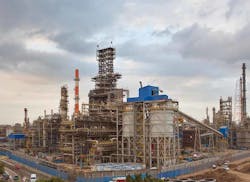Egyptian Refining's Mostorod refinery reaches full production rates
Egyptian Refining Co. (ERC) has achieved full startup and production rates from key units at its recently commissioned hydrocracking refinery built within the existing Mostorod Petroleum Complex, 20 km northeast of Cairo in Qalyoubia governate, Egypt (OGJ Online, Nov. 11, 2019).
As of Dec. 21, the refinery’s naphtha hydrotreating unit, Axens Group-licensed Octanizing continuous catalyst regeneration (CCR) reforming unit, Prime-D diesel hydrotreating unit, and single-stage HyK hydrocracking unit were fully operational and producing at full rates, Axens said.
Alongside delivering technology licensing, the process design package, proprietary equipment, catalysts, and technical services for the major processing units, Axens is providing ongoing close monitoring of the units via implementation of its proprietary Connect’In digital technology services, according to the service provider.
While Axens disclosed neither a value of its work on the project nor unit capacity details, official project documents from ERC identified unit capacities as follows:
• Naphtha hydrotreating unit; 22,600 b/d.
• Octanizing CCR reforming unit; 15,900 b/d.
• Prime-D diesel hydrotreating unit; 32,100 b/d.
• Single-stage HyK hydrocracking unit, equipped with recycle meeting high conversion; 40,800 b/d.
In addition to its 4.7-million tonnes/year (tpy) main vacuum distillation unit, a sulfur recovery block, and hydrogen production plant, ERC’s refinery also features a 25,000-b/d delayed coking unit, which together process mainly atmospheric residue feed from Cairo Oil Refinery Co.’s adjacent 8-million tpy Mostorod refinery. ERC's refinery produces Euro 5-quality refined products—including 2.3 million tpy of diesel, 600,000 tpy of jet fuel, 315,000 tpy of fuel oil, 860,000 tpy of naphtha and reformate, and 80,000 tpy—primarily for Cairo and surrounding areas.
About the Author
Robert Brelsford
Downstream Editor
Robert Brelsford joined Oil & Gas Journal in October 2013 as downstream technology editor after 8 years as a crude oil price and news reporter on spot crude transactions at the US Gulf Coast, West Coast, Canadian, and Latin American markets. He holds a BA (2000) in English from Rice University and an MS (2003) in education and social policy from Northwestern University.

